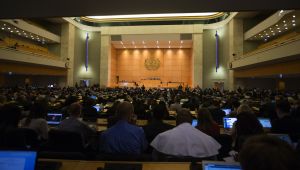Since the collapse of the Soviet Union, Graham Allison--director of the Belfer Center for Science and International Affairs at Harvard's Kennedy School of Government--has consistently warned policy makers about the dangers of a nuclear weapon falling into the hands of terrorist groups such as Al Qaeda. In his 2004 book, Nuclear Terrorism: The Ultimate Preventable Catastrophe, he put forward an arresting thesis: A nuclear terrorist attack on America was inevitable if no improvements were made in securing the world's nuclear bombs and fissile materials, but preventable if the threat were met with swift and comprehensive action.
This clarion call followed three decades in which Allison served as one of the leading U.S. analysts of security and defense policy, with an emphasis on nuclear weapons and terrorism. He served as a special adviser to the defense secretary under President Ronald Reagan and as the assistant defense secretary in the first Clinton administration. He twice received the Defense Department's highest civilian award, the Defense Medal for Distinguished Public Service. The second time, the honor recognized his efforts after the breakup of the Soviet Union in securing the return of more than 12,000 tactical nuclear weapons from the former Soviet republics as well as the elimination of more than 4,000 strategic nuclear warheads that once targeted the United States and had been stationed in Ukraine, Kazakhstan, and Belarus.
President Barack Obama declared last April: "The single biggest threat to U.S. security, short term, medium term and long term, is the possibility of a terrorist organization obtaining a nuclear weapon." In the last year, the administration has led a surge of initiatives that included signing the New START arms reduction agreement between Russia and the United States and convening the Nuclear Security Summit at which leaders from around the world focused solely on the threat of nuclear terrorism. But all of this is just a start. Allison spoke with the Bulletin about recent events and what needs to be done today to turn rhetoric about tightening nuclear security into stronger action.
BAS: Is it possible that the global nuclear order today is as fragile as the Wall Street-centered global financial order was two years ago, when we were assured that it was sound, stable, and resilient?
ALLISON: Yes. The starting point is modesty about our ability to assess systemic risk. If you imagine, let's just say six months ago, someone had said, "The euro is at risk, given a fatal flaw in its design-namely that it puts the cart of monetary unity before the horse of fiscal discipline," people would have said: "Yeah, but the euro has been rising against the dollar for a decade."
Consider the state of the global nuclear order today. One of the smallest, poorest, most isolated states on Earth, namely North Korea, has over the past decade successfully violated the rules of the order and defied the direct demands of the regime-keepers-the great powers, namely the United States and China. Similarly, four rounds of U.N. demands and sanctions have not prevented Iran's mastering the technology of enrichment and accumulating a stockpile of low-enriched uranium sufficient, after further enrichment, for its first two bombs. If, God forbid, the nonproliferation regime were to unravel or collapse in the next six months or a year, in the way the financial meltdown occurred after the collapse of Lehman Brothers, it would be easier to write the book on why this has happened, than it was in the case of the financial crash.
For full text of "Bulletin of the Atomic Scientists" interview>
"Graham T. Allison: The Congenital Optimist." Interview, Bulletin of the Atomic Scientists, September/October 2010.
The full text of this publication is available via Bulletin of the Atomic Scientists.




